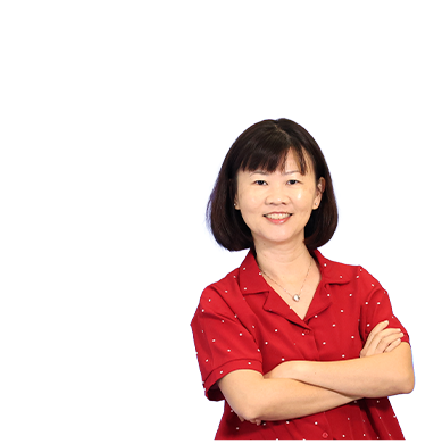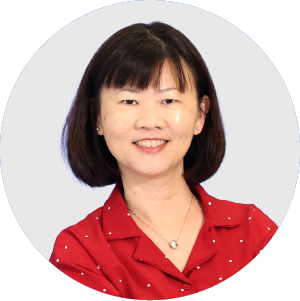我的祖籍是...
年轻一代的新加坡华人还看重自己的籍贯吗?
籍贯和寻根的意义

黄钰清Lynn Wong
冈州会馆青年团主任

陈扬意Carine Tan
Our Grandfather Story联合创办人

陈素君《联合早报》副刊编辑
陈宇昕《联合早报》副刊记者


陈素君《联合早报》副刊编辑

陈宇昕《联合早报》副刊记者
中
EN
Some discussions can go on forever.
Some stories cannot be told enough.
Welcome to Zaobao podcast Same Same But Different. I'm Yu Xin.
I'm Sor Koon.Same Same But Different is presented by the Singapore Chinese Cultural Centre. Let’s learn about the culture and stories of Chinese Singaporeans together.
In the podcast, we chat with Chinese Singaporeans from different backgrounds about how they view their Chinese identity.
(Slang in Teochew)Teochews have red buttocks.
(Slang in Hokkien)Hokkiens are thick-skinned.
I think this must be fake.
How so?
You probably will not examine the buttocks of every Teochew to see if they are red.
That slang is quite common. To clarify, I made up that Hokkien line in response to it. Is Yu Xin familiar with your dialect?
Not really, because when I was little, my grandmother brought me up, but she did not interact much with the kids. My parents spoke Mandarin to me, so my Teochew is very poor.
Well, that is probably the struggle of many young people today. I wonder if our guests today know much about their dialect groups?
Should there be dialect information on birth certificates?
Hello everyone, we invited two guests to our podcast today. Let's welcome Carine Tan and Lynn Wong. Carine is the co-founder of local media company Our Grandfather Story.
Hello everyone.
Our next guest is Lynn, who is the winner of Singapore Federation of Chinese Clan Association’s first Outstanding Youth Award. She is also the youth group leader of Kong Chow Wui Koon Singapore.
Hello everyone.
We will start with a recent hot topic today. We are going to talk about your dialect group. You may have read the news recently and heard that the omission of dialect groups from digital birth certificates saw public backlash. Subsequently, the authorities decided to reverse the decision and reinstated the dialect information in September. We often hear that people no longer care about their dialect groups. What was your reaction when you read the news? Were you surprised that people reacted this way? Did you feel that it was necessary to preserve our identity? How do you feel about it? Carine, what do you say?
I think our (dialect) names are special. For example, my surname and my brother-in-law's surname are both Chen in Mandarin. But he is a Hakka, so his surname is written as Chin in English while mine is Tan because I am a Hokkien. From our names, we can trace our origins, and it is very special. We should not take that away.
For me, the information about my dialect group on the birth certificate is too general. My birth certificate says that I am from Guangdong, but I do not know which part of Guangdong specifically. I hope that in the future, when people complete the declaration form, they can provide more information. Before they removed the dialect group, there were already discussions about digitalisation of the birth certificate. At that time I started to think about the consequences of digitisation. What should we do when the birth certificate is digitalised? When we conduct research, these physical records are an important source of infomration.Digital copies are easier to preserve, but it is still better to have the physical materials that can be touched.
So you prefer the printed form?
Yes, it can be considered an artefact of our time. It will become an artefact in 50 years. How many of us have collected the documents of our ancestors when they first arrived in Singapore? These artefacts should be preserved. What will be the artefacts that mark our next generation?
You suggested that we should go further in tracing our roots. Not just Cantonese, but the part of Guangdong that we are from. When we talk about dialect groups, how far back should we go? Is it my grandfather, or my grandfather's grandfather, or my ancestors generations ago? Where do you stop?
As detailed as possible. For example, it is currently difficult for Singaporeans to trace his roots. For me, I can proudly say that I am from Guangdong Province, Zhaoqing City, Xinxing County, and Tiantang Town. From there, I can find my ancestral temple. During our grandfather's generation, when they talk about their origins, they would not simply say “I'm a Cantonese”. They would go on to say where they are from. Our ancestors have a strong sense of geographical identity in China.
Do you know about your dialect group?
Carine, do your friends of a younger generation care about their dialect groups?
Some people around me don’t even know their dialect groups. They mostly speak English at home, very little Mandarin. When you ask them what their dialect is, they don’t know. When you ask what dialect their grandparents speak, they may not know either. Even when people around them speak dialects, they cannot tell the origins of the dialects.
In the future, is there a possibility that we will simply tell our children and grandchildren that I am from Redhill, or I am from the East Coast, instead of telling them that I am a Teochew or our dialect group?
Today, when I ask my parents or my grandparents, they will say that they used to stay in the downtown area, South Bridge Road or they are from the countryside. In those days, “countryside” referred to the Lim Chu Kang area where people reared pigs and chickens. The communities were divided into “urban” and “rural”. However, when I tell my grandchildren where I am from, there is no longer such a divide because everyone lives in a prosperous Singapore city.
Revisiting one’s roots
I was actually not aware of my ancestry roots until 5 years ago. Prior to that, I did not know my ancestry. All I know is that I am Cantonese. I was like most young Singaporeans who are unaware of their ancestry. When my grandfather passed away, I felt the urgency to know my ancestry and began to ask questions that I usually don’t bother. When my grandfather passed away, I asked my Dad about the origins of our family, but he did not know. Fortunately, my granduncle was around. So I quickly went to ask him and he told me exactly the county and town of our ancestors. I hope this generation will make use of every opportunity to ask these questions. We can easily get the answers now. We may not find the answers if we wait for another 10 years, and will live to regret it. Our next generation will also lose the important links to know more about their roots.
My grandparents passed away before I was born. So the only clue I have is that they are from Anxi, Fujian. I belong to the 70s generation, and because of this podcast, I went to find out more about Anxi. It is in Fujian, China, a coastal area, and it is famous for producing tea leaves. So today, I also learnt something about my ancestry.
My grandmother brought me up. After she passed away, we visited her hometown. I am attached to my grandmother, but not so attached to my other ancestors. My definition of revisiting my roots, refers to visiting the place that my grandmother used to live in. But for others, it may refer to the whole Teochew culture. They have to visit some famous places of interest, or visit our ancestral temple. I need to feel the direct blood line connection, which in this case is my grandmother, so my dialect group is tied with hers. As for my grandfather, he passed away when I was very young.
To prepare for this interview, I had a chat with my aunt. She told me that she went with both my grandfathers to Fujian province to visit their ancestral house. My grandfather was born in Singapore, he had visited the ancestral home twice. In his second visit, he went with his family including his eight children, and could still recognise the way, even though they arrived at midnight and it was pitch dark. Before visiting, they notified the villagers by writing letters, but unfortunately they did not receive it. Nevertheless, they received a warm welcome. My aunt told me that my grandfather’s generation was emotionally connected to their homeland, even though they were born in Singapore. However, for the younger generation like us, we do not have this connection.
How relevant is dialect to the younger generation?
When it comes to revisiting our roots, it takes time to study our long ancestry. Let’s talk about what is closer to our daily life such as the dialects we speak. In my time, I learnt my dialect from my grandparents who brought me up. So I speak their dialect, which is Hokkien. In your case, how did both of you learn your dialect?
I was raised by my maternal grandparents. They came from Fujian, so I speak more Hokkien. My paternal grandmother is from Guangdong, but we did not live under the same roof, so I am not very good with Cantonese.
Regretfully, although I stayed with my grandparents under the one roof, maybe due to the bilingual education policy, when my grandparents spoke Cantonese with my relatives, I tend to self censor and filter out the dialect.
With the passing of our forefathers, it can be difficult for the young generation to learn and speak dialect nowadays.
Yes, you need to regularly use the dialect to communicate. Similar to my Japanese, I learnt the language for four years, but I have forgotten it now.
No opportunity to practice, right?
Yes.
My elders have passed away. I only use Hokkien in wet markets and hawker centres.
How should we preserve dialect culture in our life?
Both of you produce videos that document local culture.Do you feel an urgency to preserve our culture?
It's not how I begin. When we collect stories, we consider the ethos of the protagonist behind the story. It’s good if the story conveys the ethos of our Chinese tradition, and the ethos gets passed on to the next generation.
I do it differently. 5 years ago, I started to do this work because I felt that many things were disappearing, and I want to document them. The first assignment that I gave myself 5 years ago was to set up the Ho Yeah Festival which was about Cantonese and Hakka culture. I use food as the central theme because Singaporeans love food and food will entice them to know more about the culture. Each time, I would focus on different dialect groups, especially Kwong Wai Siew Peck San Theng, which includes 16 clan associations. I would conduct in-depth research. In the first year, I studied Kong Chow Wui Koon, Tung On Wui Kun, Wui Chiu Fui Kun and Koh Yiu Wooi Kwoon. In the second year, I focused on Ning Yeung Wui Kuan. I filmed a documentary where I searched for profiles who speak their Toi San dialect and asked them to use the language to express themselves. They may not speak the dialect well, but it is how they speak it today. I just want to document a generation of people and their language. Although I do not speak Cantonese well, I would challenge myself every now and then. Last year, I wrote lyrics and sang a one-minute Cantonese rap. My friend helped to compose the music.
Would you perform the song for us?
Sure, the song begins this way.(Rap in Cantonese): I am the fourth generation to be born in Singapore. I often hear my grandfather talk about our ancestral home. My grandmother often cooks delicious food at home, but I cannot find the dishes on the streets. One day a friend brought me to the Bishan Ho Yeah Festival. Only then did I realise that there are more than 16 clans in Guangzhou, Huizhou and Zhaoqing region.Our ancestors brought their hometown delicacies to Nanyang, and the delicacies have gradually been localised in Singapore. That’s about it.
Wow, that is great!
My pronunciation is not accurate.
This is an interesting way to attract the attention of young audiences, and spark their interest in their dialects.
Do you preserve any practices in your everyday life that remind you of your dialect group? It can be food or a ritual?
For example, during Chinese New Year reunion dinners, do you serve any must-eat Hokkien or Cantonese dishes?
As a Teochew, all 15-year olds must experience the coming of age ceremony when guys become adults. However, my mother would still say that I am not allowed to date girls.
Talking about coming of age as a Chinese person. My friends know that I take my birthdays seriously. I tell them that I celebrate two birthdays. My family would prepare mee sua (wheat vermicelli) for me on my lunar birthday.
Cantonese people love soup. It is my comfort food. Whenever I’m stressed, I crave for soup. For Cantoneses who grew up at the clan association, sharing roasted pork is a common practice. After the Spring and Autumn Ancestral Veneration rituals during the Qing Ming Festival and Double Ninth Festival, children will wait for the roasted pork to be sliced and served, and everyone digs in.
Our generation has the opportunity to recover things that have been forgotten. Our generation is possibly the last generation to be able to do it. It could be our last chance. For example, I am preparing to publish a book about the Qixi Festival. Recently, the festival is widely celebrated in China as the “Eastern Valentine's Day”. If you look at Singapore's history, it goes beyond "Eastern Valentine's Day".
In 2017, during a casual chat with a member of the clan association, I discovered that this major festival has disappeared. I feel that I cannot let it just disappear. Thus, I interviewed more people to find out more and uncover more information about the festival.
Things are disappearing in Singapore because no one is uncovering them. Many things would be forgotten if no one cared to talk about it, but it does not mean that it never existed or is insignificant. It would be a shame if they are lost forever.
Culture does not originate from our ancestral home. There is also interaction (with other cultures).
All of us preserve our roots and culture in our own way. Both of our guests are passionate about it, and we hope that their efforts can inspire friends in their age group. Let’s continue with this journey together and hope that more people will join us. With more people joining us, our discoveries will be more enriching and complete.
Thank you to both of you for taking the time to join us on our podcast today.
Thank you both.
Thank you.
Thank you.
I am Tan Sor Koon.
I am Tan Yu Xin. Thank you for tuning in to our podcast!
Same Same But Different podcast is presented by the Singapore Chinese Cultural Centre.Producers:Bian He, Ong Wen Yi and Lee Yi QianPost-production:Hoe Jian WeiZaobao podcasts are available on zaobao.sg and major podcast players. If you like our podcasts, please share and subscribe to them.
一些话题讲不完。
一些心声听不够。
欢迎收听早报播客《三言两语》。我是宇昕。
我是素君。《三言两语》由新加坡华族文化中心呈献。与我们一同了解新加坡华人的文化和故事。
我们在节目里,与来自不同背景的新加坡华人聊聊他们如何看待自己的华人身份?
(潮州话)潮州人屁股红红。
(福建话)福建人脸皮厚厚。
我觉得这一定是假的。
怎么说?
你大概不会去检测所有的潮州人,看他们的屁股都红红的吧。
这个俗语倒是用的挺普遍的,刚才那个福建人的那方面,我还是配合这个潮州人,临时想的一句。那宇昕对于自己的这个方言熟悉吗?
其实不是很熟悉,因为小时候,虽然阿嬷带大我,但是阿嬷跟小朋友没有什么讲话,然后父母亲又跟我讲华语,所以我的潮州话其实是很糟糕的。
这可能也是现代很多年轻人的苦恼。不晓得就是我们今天的嘉宾,他们又是如何去看待跟理解自己的籍贯?
"报生纸"应该注明籍贯吗?
哈啰,大家好,今天我们邀请到的两位嘉宾,让我们欢迎陈扬意和黄钰清。那扬意呢,是本地视频媒体 Our Grandfather Story 的联合创办人。
哈啰,大家好。
我们的另外一位嘉宾是钰清,钰清是宗乡总会首届杰出青年奖的得主,也是冈州会馆的青年团主任。钰清,你好。
大家好。
那我们今天其实就从一个近期比较热的一个话题来切入。我们今天想谈的这个籍贯的东西。那因为大家如果注意看新闻的话,其实知道不久前那个数码报生纸不再注明籍贯这件事情引起了蛮大的反弹,后来导致当局决定 9月要把那个籍贯再次显示出来。那大家反应这么的热烈,可是我们又经常会听到,其实大家已经不在乎籍贯这个事情了。那我不知道两位嘉宾哦,你们自己看到这个新闻的时候,你们自己是怎样的一个反应?是觉得很惊讶吗?大家有这种反应,还是你觉得就应该要这样子做去维护我们的某种认同感吧,你们怎么看的。扬意你先说吗?
其实我觉得我们的名字是一个很特别的东西,比如说我姓陈,然后我的妹夫,他也姓陈,可是他是一个客家人,所以它的英文的姓氏是Chin,那么我是福建人,我是Tan。所以我觉得从名字上可以看到籍贯这种东西是非常特别的,我们不应该把它拿掉。
对我来说报生纸上面籍贯本身的一个资料算是笼统了,就好比说我的那个报生纸上面是写广东人,可是其实我不知道我是广东哪里人。我希望以后,在申报的人当中他们可以自己填上更多资料,其实他在拿掉那个dialect group(籍贯)的时候,他们之前一直讲说要把它变成一个电子化,那个时候我已经开始在想说电子化那怎么办呢?我们在做文史研究,发现到其实这些物质东西也是蛮重要的,因为很多时候电子化当然可以保存,可是其实有一个可以摸得到的东西也是不错的。
所以你很注重有纸质的,或者就是看到,印出来的?
对,因为这算是我们年代的一个文物,因为就是你多50年后就是个文物了,好比说现在我们还有谁有收我们的先辈登陆的那些文件,所以这东西应该好好存下来。如果我们的下一代出生的时候,有什么东西是记录他们那一代的文物呢?
你刚才说的就是我们要找得更细,就不只是广东人,我可能有不同的渊源才到广东,或者是我是广东的哪里人,可是我们在讲籍贯的时候,到底要追到多细?追上哪一段历史?就是我阿公就好,还是我阿公的阿公,还是我的老祖宗18代以前的?你自己追踪的时候会把它标在哪里?
越细越好,好比说如果现在任何新加坡人要去寻根,如果你是广东人,真的太难找了,好比说我可以很骄傲地说,我是广东肇庆府新兴县,而且我是天堂区。所以这样的话就很细,我可以直接去找我的那个祠堂。不用说太远了,可能我们的爷爷那一代,他们自我介绍的时候都是这样讲的,没有说我是广东人,就这样。他们会接着讲的,因为很多时候,我们的祖先在中国的时候,他们对于自己的地缘的身份认同感是很强烈的。
你了解自己的籍贯吗?
那么,像扬意这个年代的年轻人,你的身边的朋友对祖籍,对籍贯这些东西会关心吗?
其实我身边的人,我觉得他们有些连自己的籍贯是什么都不懂。他们通常在家里就会讲英语啦,华语也是说的蛮少的了。当你问他们的方言是什么的时候,他们讲我不知道。你问他们的祖父母说的是什么方言,他们可能也不知道。所以他们虽然身边有人在说方言,可是他们也分不出那是什么样的一个籍贯。
可是会不会就是可能以后,我们会跟我们的孩子、孙子讲,我是红山人,我是East Coast(东海岸)人,会不会有这种情况?就是我不再跟他讲,我是潮州人还是什么的。
我觉得好像现在我跟我的父母,还是我的阿公阿嫲讲话的时候,他们会讲,我是坡底人,我是大坡人,还是我是乡下人,那种乡下是like Lim Chu Kang(林厝港)那种养猪养鸡的,因为当时的年代还有分,好像你是比较城市化的,你是比较rural(乡村)的一带的人。可是如果以后我要跟我的孙子讲我从哪里来的话,我觉得可能没有这样大的一个差距,因为每个人都住在一个很繁荣的新加坡。
踏上寻根之旅
刚才讲到,好像我一路来都知道我是哪里来的。其实不然,我应该是5年前才知道我是哪里人,我一直以来都不知道我是哪里(人)。我只懂我是广东人,所以可能是跟大多数的新加坡年轻人一样,就对自己的籍贯,还是自己的那个祖辈从来都不知道。我是因为爷爷过世的时候,才开始有些慌张,你想要去知道一些你平时没有去问的问题,所以在我的爷爷过世的时候,我去问我爸爸,那我们是从哪里来的?他可以跟我说吗?他不知道。我的叔公还在 ,快点去问叔公,他一问就很快就有答案了,直接跟你讲哪一个地方哪个乡、哪个村。我希望我们这一代人,有机会尽管去问,因为其实很多时候我们就单单问就有答案了,你不要等到你过了十年没有人问的时候,你就是后悔莫及了。我觉得是剥削了我们下一代认识自己根的一个重要的线索。
我的年代,像我的阿公阿嬷,在我出世的时候,他们就已经过世了,所以其实我唯一知道的线索就是他们是福建安溪人。我是70年代出世的,然后因为要做这个节目,我就特别去找一下这个安溪到底是什么样的一个地方。原来是中国福建,就是沿海地区的一个地方,然后是以产茶叶为出名的,所以我今天也对我的祖籍有一点点认识。
像我的阿嬷是带大我的,后来她过世之后我们有去她的老家看看,那对我来讲我的籍贯是跟着我的阿嬷的,而不是那些遥不可及的祖宗们。所谓的寻根之旅的时候,我最关心的是我看到我阿嬷以前住过的那个房间,但是对他们来讲,它是整个潮汕的文化,他们都很关注,然后一定要去拜访什么什么某个名胜,或者是去我们祖庙看看。对我来讲就是我必须要有一个很直接的血亲的一个联系,就是我阿嬷,所以我的籍贯等于我的阿嬷,因为我的阿公在我很小就过世了。
我知道我会上这个访谈的时候,我就跟我阿姨说了一些话,她就跟我说,其实她以前跟着我的祖父跟着我的外公,有去到他们的祖籍福建省一带去看他们的祖屋,他们讲祖厝,然后其实我的阿公是在新加坡出世的,所以他只去过他的祖厝两次,可是他第二次带他的一家大小,他的8个孩子回去的时候,他还认得那条路,晚上12点多到达的时候,要摸黑了,找到那个村,村里的人没有收到他们的信,因为他们来之前他们有写信,可是他们没有收到。可是尽管如此,他们还是非常的热情地招待他们。然后我阿姨就跟我说那一代人 ,会一直向往他们的祖国。尽管他们是在新加坡出世的,他们还是对他们的祖国、他们的父亲的一辈还是有这样的一种联系,对我们年轻一代来说,可能已经没有这样的一种关系了。
年轻一代与方言的距离
讲到这个寻根,可能需要有一定的时间,跟去发掘关于自己祖籍的一些东西。比较接近我们的是,像我们平时用的语言像方言,因为像我的年代,我的方言是因为我是外公外婆带大的,所以我会讲他们的方言就是福建话。那不晓得两位,你们怎么接触、怎么学习你们籍贯的方言?
我也是由我的外公外婆带大的,他们是从福建来的,所以我就比较会讲福建话。我的奶奶是广东人,可是因为我没有跟她同住在一个屋檐下,所以我对于广东话没有这样厉害。
我很遗憾,虽然说我是从小跟我的爷爷奶奶住同一个屋檐下, 可是那个双语政策吧,就变成虽然说爷爷奶奶会跟我其他的亲戚讲广东话,可是我就会self-censor,self-filter(自我过滤), 就是等于有听等于没有听到。
而且随着就是我们的祖辈过世,其实现在的年轻人要接触方言,学习讲方言这块真的是还挺有难度的。
对,你需要一直沟通才可以,好像我学日语,可是我学了4年之后我又忘记日语了。
就没有那个练习的环境,对吗?
对。
像我现在的福建话,因为祖辈已经过世了,我的福建话就只能在巴刹、在小贩中心用得上而已。
如何在生活中保留和记录我们的籍贯
两位做很多不同的,跟地方生活非常有关的一些视频,你们是不是有这种心情,我一定要在结束之前赶快收集起来这些东西。
我没有以那个为我的出发点。我们在收集故事的时候,我们看中的是那个故事背后的那个,故事人的精神之类的东西。那如果说他的精神传达出我们中华传统的一些精神的话,那就很好了,就是因为他把这个精神传承下去。
我可能就比较相反,其实我之所以5年前就是开始从事这一行,因为我觉得有很多东西在消失,那我也想尽量去捕捉。5年前我第一个给自己的任务就是要做《好嘢节》,就是以广客文化为主的一个节日。那每次,我就会以美食为主,因为毕竟新加坡人就是有美食才会对于文化比较想要了解。所以我就以那个为一个主干,然后每次,我会以不同籍贯,而且我是很注重专注于广惠肇的一个籍贯,就是有16间会馆,所以我就从那边开始深入研究。好比说第一年的话,我就是研究了新会、东安、惠州,还有那个,还有那里的高要。然后第二届的时候,我是专注只看台山,所以变成我在做纪录片的时候,我是特意叫还会讲台山话的人,就用台山话来表达,就算可能他们觉得自己讲的不标准,可是就以他们平时用的台山话来讲,然后就做一个记录。然后这样子的话,我觉得也可以记录那一代人,他们的那个语言,那我本身自己广东话是不行,可是我每次都给自己一个挑战。就好比说去年,我就自己写词还有自己唱,就是说唱的方式,而rap(说唱)那个一段广东话的一个,一分钟的rap(说唱),然后叫朋友帮忙作曲。
你要不要在节目中跟我们分享一段,还是秀一小段呢?
可以, 开头是这样的。(粤语说唱):我是新加坡出生的第四代。常常听到爷爷讲祖籍在哪里。家里常常吃到奶奶煮的好吃的东西,怎么外面找来找去都找不到。一日朋友带我参加碧山好嘢节,才知道广惠肇地区有不只16个。我们的祖先下南洋带来的家乡菜,后来都在新加坡渐渐 localise(本土化) 。大概就是这样。
哇,我觉得很棒。
说得很不标准。
我觉得可能用这样的方式反而可以吸引到年轻人的目光,可能他们会开始对自己的方言感兴趣,其实也是挺有意思的。
两位在生活中有没有觉得就是你做了某一件事,让你觉得你最像你们各自籍贯的一件事,或者吃的一个东西,或者某个仪式之类的。
比如过年过节,团圆饭,还是什么的,有没有必吃的福建菜,还是广东菜这样子?
或者是像我潮州人,15岁一定要出花园,然后男生,本来讲你成人,但是15岁妈妈还是讲你不可以交女朋友这样。
像你讲的这个华人15岁让我想起,其实我本身, 好像我身边的朋友都会知道说,我很重视像这种生日这方面的东西。然后我每次去跟人家讲,我每次都会有两个生日。然后我家里的人,他们也会在我农历生日时候好像煮面线给我之类的。
广东人话就比较喜欢喝汤吧,好像我comfort food(让我开心的食物),每次我压力大,我就想要喝汤。如果说是在会馆长大的话,我觉得一个比较所谓的有象征式的东西,就是广东人,就是每天喜欢分烧猪,就是好像我们叫春秋二祭,就是清明,还有重阳的时候,每次就是祭拜完那些先辈以后,所有的孩子们就是会等着那一刻,就是他们切烧肉,然后大家就有的吃。
其实我觉得我们这一代人还有机会去寻找一些可能已经被遗忘的东西。我觉得我们这一代是最后一代了,最后一个机会了。好比说,我现在在准备出书。那本书写的是七夕节,就可能在中国,最近很火,搞得比较热,就是把它定义为东方情人节。那其实如果你看新加坡的历史的话,它不只是东方情人节。
我是在2017年跟一个会馆的会员闲聊的时候,才发现到原来有这么一个大的节日竟然消失了。所以我才觉得,好奇怪,不可以,我要去访问更多人去了解,去挖掘。
新加坡其实还有东西在消失,只是没有人去挖掘,因为很多事情人家不在讲就已经被淡忘了,可是不代表它不存在,也不代表说他没有意义。如果这些东西已消失,真的是会很遗憾的。
就是我们可以看到,文化不只是我们单纯地从我们祖籍地,找到我们的东西,其实是互相影响的。
大家就是用自己的方式来保留自己的根,保留自己的文化。那像我们今天两位嘉宾, 对这方面可能比较热忱,所以也希望他们的这种努力可以感染身边同龄的朋友。让我们一起就是在寻根的这个路上,其实可以更加的就多人参与, 那么我们的发现应该会更加的丰富,更加完整。
谢谢两位。今天抽空上我们的节目。
谢谢两位。
谢谢。
谢谢。
我是陈素君。
我是陈宇昕。谢谢收听!
《三言两语》由新加坡华族文化中心呈献。编导:卞和、王雯镱、李宜倩后期制作:何犍玮早报播客可以在zaobao.sg,以及各大播客平台收听。欢迎你点赞分享。